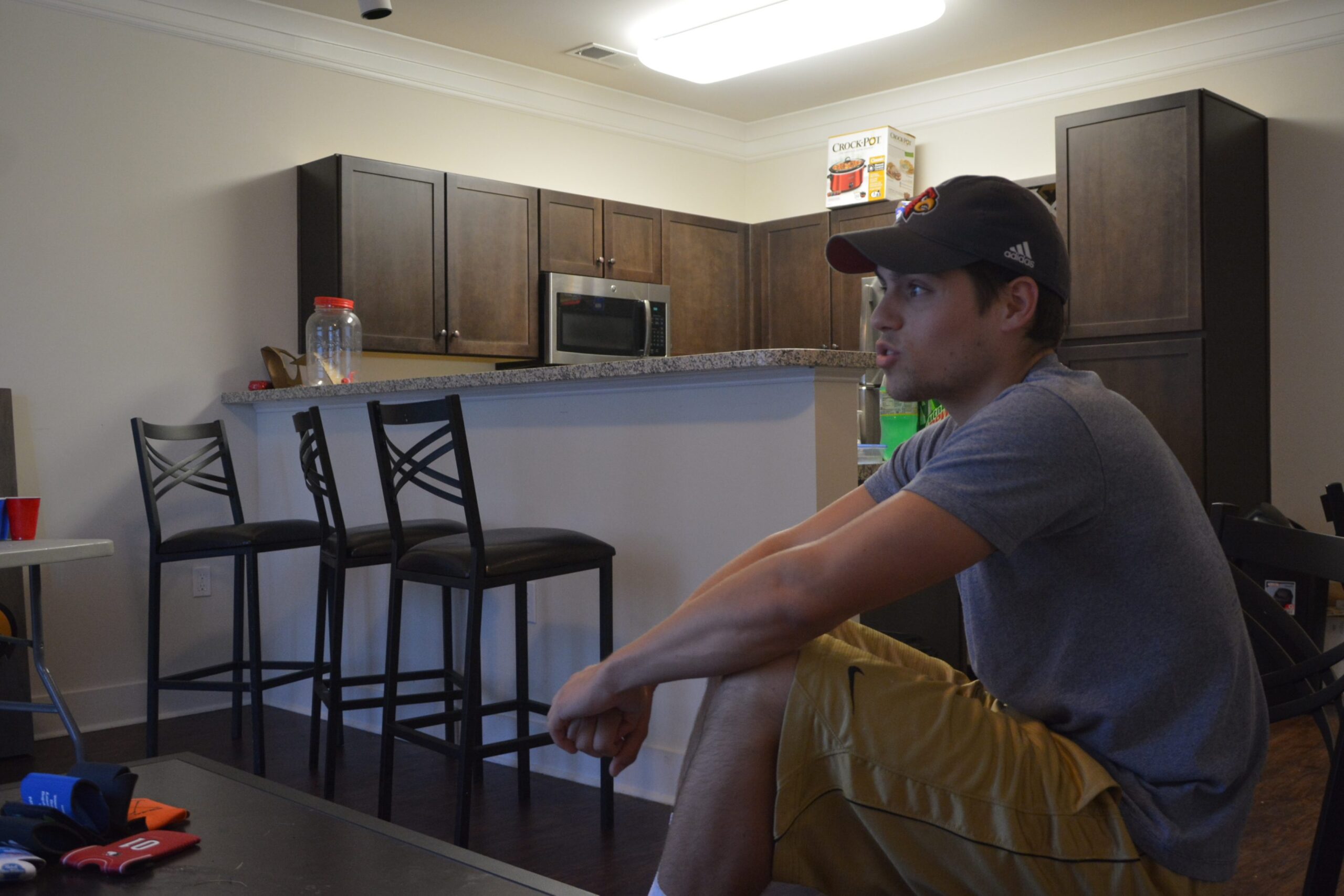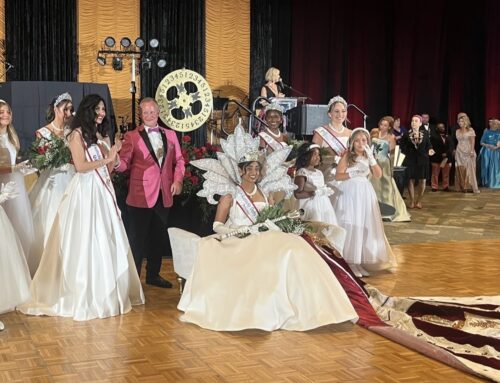By Olivia Krauth–
With new off-campus housing options opening yearly, are students getting safe, affordable housing around U of L?
The aesthetic of junior communication major Austin Browning’s cottage at The Retreat is best described as “frat boy.” A fraternity yard sign is visible from a second floor window. Louisville-themed cornhole boards – a Christmas gift from Browning’s mom – are propped against a back wall, fresh from tailgate. An American-themed flag bearing Browning’s fraternity letters hangs on the wall, one of few decorations in the living room.
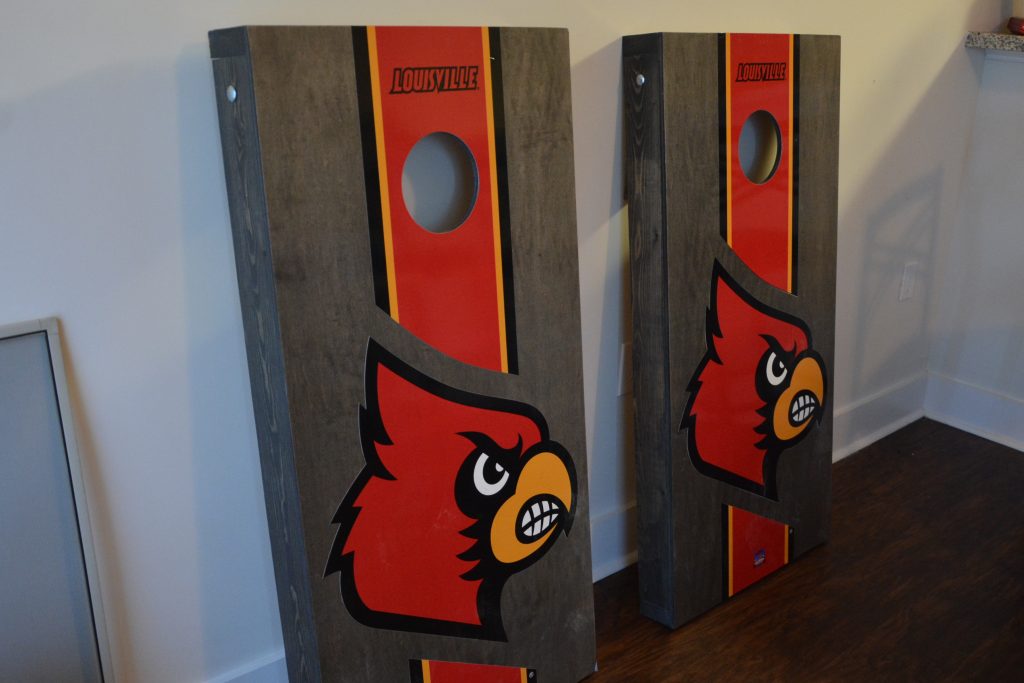
Photo by Rachel Bunger / The Louisville Cardinal
Then there’s Brady, Browning’s five-month-old dog whom he calls the “frat hound.” One of Browning’s favorite parts of The Retreat are the amenities, both human and dog-friendly.
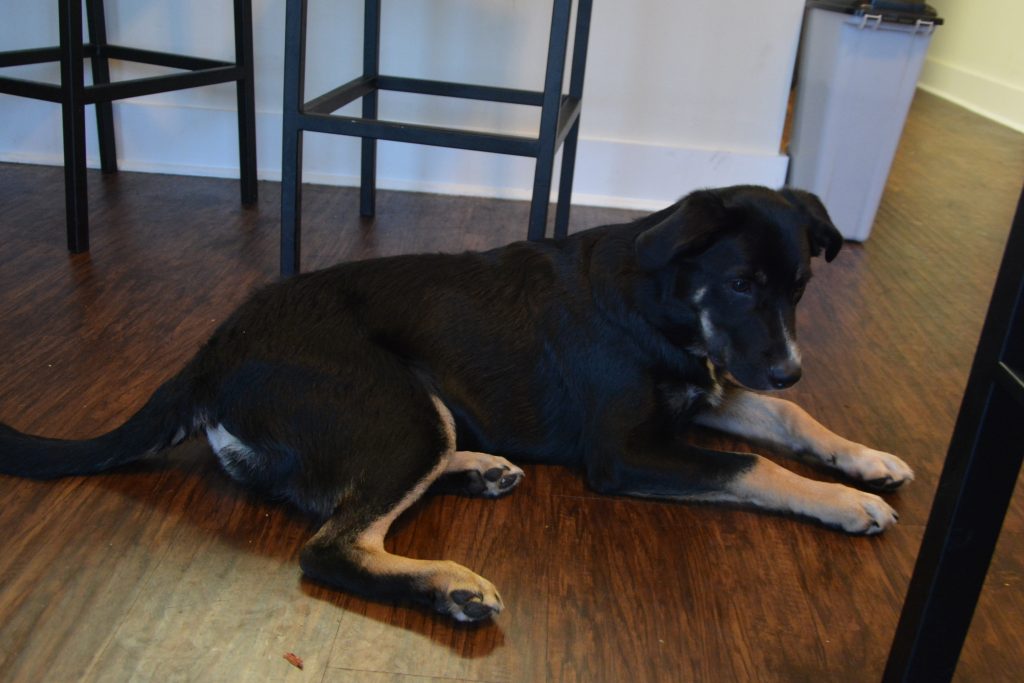
Brady, Browning’s dog who lives with him at The Retreat. Photo by Rachel Bunger / The Louisville Cardinal
“Guys come over and we go to the pool, we go to the gym, we play basketball here,” Browning said, fixing his hair underneath a U of L baseball cap. “It’s very dog-friendly – this is probably the most dog-friendly place. There are places to walk your dog like trails.”
At this point, the interview halts as Brady jumps on the coffee table, one of the few places at The Retreat he isn’t allowed to be.
The Retreat is one student housing option built near U of L in the past few years. The unaffiliated, student-focused collection of cottages joined affiliated and unaffiliated apartment complexes in the fight for students’ rent money in 2015. Since, another affiliated option – The Nine – and a hybrid complex – University Pointe – have opened.
With freshmen required to live on-campus, upperclassmen are often sent to off-campus housing – houses and apartments in surrounding neighborhoods, unaffiliated apartment complexes and affiliated apartment complexes.
U of L Director of Campus Housing Julie Weber explained the four types of U of L-tied student housing. Two options – housing and residential life buildings and ULH Inc. – are on U of L property. The third is University Pointe, which is managed by a third party but is leasing U of L land and abides by more U of L rules than affiliates. The fourth option is affiliated housing – off-campus privately owned options. Some options, like The Retreat, aren’t tied to U of L but house predominantly U of L students.
After four new off-campus student housing options added 2,455 beds in three years, 2016 is the first year without a new project. Has the housing boom halted?
According to two Cardinal surveys in 2015 and 2016, student opinion towards off-campus housing options is slowly shifting. While students find the options unaffordable, they’re more likely to like where they’re living.
In 2015, 61 percent of respondents said they didn’t think options were affordable for students, who typically pay rent on their own. A year later, results are closer – 37 percent say it isn’t worth the money, while 47 percent say it is worth the cost.
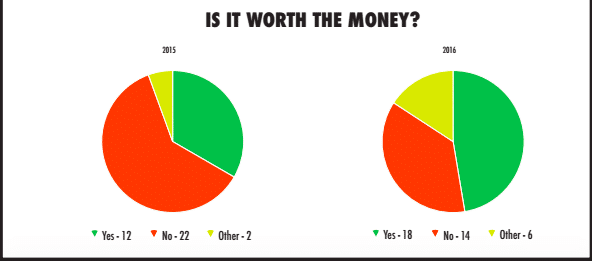
“To me, it was worth it,” Browning said. “What they offer and how much it was actually going to cost to live here seemed a lot more cost efficient than some places.”
Browning pays $635 per month for his share of a three bedroom, three bathroom cottage – a total of $1,905 for the unit.
Most student options are inclusive, so electricity and other bills are covered in the rent – a difference from many off-campus apartments and houses. According to U.S. Department of Housing and Urban Development’s 2015 statistics, the fair market rent for a two-bedroom apartment in the 40208 zip code is $670 before bills.
“I came from a place that was not furnished and I had to pay my own electric bills,” senior public health major Tiffany Chea said. “Since The Clubhouse covers it, I don’t mind paying more than I have in the past.”
Weber said options are market-driven, typically means lower rent prices. “They’re all outbidding each other in a good direction for students, which is down,” she said.
Senior marketing major Kayla Glisson said her rent at The Arch was “pretty high last year,” but dropped $70 when she renewed her lease. “It’s all inclusive, so I’m satisfied with the amount.”
Not all students are benefiting from a price drop. A Cardinal Towne resident, who requested anonymity, said their rate went up when they renewed because they were given a special rate for moving in mid-year.
“We’ve been able to maintain our lease rates in this competitive market,” JT Stinnett, The Retreat’s community manager said. The cottages we offer are very popular with students because it combines apartment living in a structure that feels more like a home. When you add that feature, which is unique to the market, with our prime location and superior amenities package, it has meant consistent renewal rates and high demand at The Retreat.”
In 2015, 65 percent of respondents would move to a cheaper place with fewer amenities. Now, only half would move.
Housing options use a variety of amenities – onsite gyms, Bluetooth-equipped showerheads, golf simulators – to attract potential residents. U of L even boasts about the upscale options as a way to attract students. The university posted a U of L-made video showing The Nine and University Pointe to their social media pages on Sept. 26, showing the courtyards and pool decks of both options.
“Housing has become a key element in the recruiting process,” Weber said in the video.
The flood of new properties and amenities isn’t just being felt by students – property managers are feeling the impact, too.
“Students are constantly bombarded with shiny new ads and amenities and features but are not doing their research to find out the best value or the best service,” The Bellamy’s property manager Craig Haughton said in an email. “It doesn’t matter if you have the newest apartment with the Bluetooth shower head if you can’t get anything fixed, are not safe or have horrible service.”
While appreciated by some residents, these amenities can drive up the rent. Both years, amenities available was not one of the things students considered the most when choosing a housing option. The top two? Rent price and proximity to campus.
In 2015, 57 percent of respondents lived in affiliated housing – The Province, The Bellamy, Cardinal Towne, The Arch and The Clubhouse. In 2016, that number dropped to 40 percent, despite The Nine opening in fall 2016.
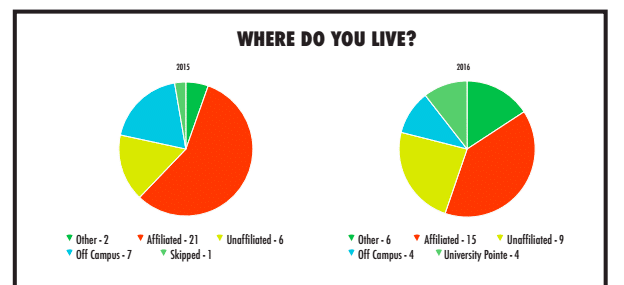
The average occupancy of the affiliated options and The Retreat for spring 2016 is 84 percent. The Province saw the highest occupancy rate, with 96 percent of its 858 beds filled. The Retreat and The Arch fell below average figures with 76 and 68 percent occupancies, respectively.
The occupancy rates do not necessarily show how many students are living there. Weber said the properties reserve 75 percent of the rooms for U of L students, with the rest available for non-students. Students must be placed on different floors than non-students, and Weber needs to give written permission if a student and non-student want to room together.
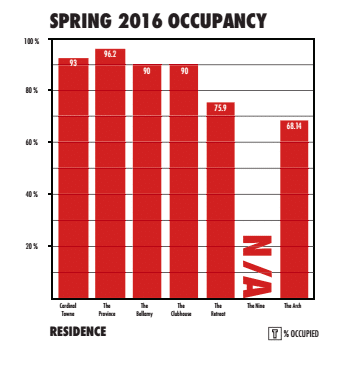
If current options are seeing increased competition and students aren’t increasingly choosing to live in them, why do developers still consider U of L?
A 650-bed project called “The Village,” slated to be on the corner of Brook and Bloom Streets near Taco Bell, was announced to the U of L Foundation in spring 2014. U of L spokesperson John Karman said the project is now on hold so its owner, American Campus Communities, can look at market conditions.
“It’s on them to do a market study and determine if their investment dollar is going to be well-served by building next to the University of Louisville,” Weber said of developers.
“Right now, we’re a little cautious because we have so much high-end housing around the campus we make sure that we’re staying in the right position in terms of number of affiliates,” Weber said. Weber said she doesn’t forsee more affiliates because there’s no available land around U of L.
To become affiliated, properties approach U of L to create an affiliation agreement, which outlines minimum unit standards (bedrooms, semi-private or private bathrooms), permits and insurance requirements.
“The biggest benefit for the apartment complexes is that they get official access to our students,” Weber said. Affiliated properties can officially market on campus, and receive student and parent contact information.
“The affiliation agreement is partially a financial agreement,” Weber said. “The complex has to pay us a fee basically for the privilege of using the U of L name and using U of L as part of their branding.”
This fee is different for each affiliated property. Some change due to inflation, and some have built-in increases. The 2016 median fee is around $53,000, with The Clubhouse paying the most at $151,600 this year.
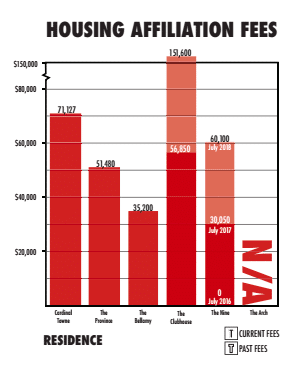
“The fee structure was different when we started the affiliation process, so each one is a little bit different depending on when they signed,” Weber said. Older affiliates like The Province and The Bellamy have lower fees than newer options, who are subject to new affiliation rules from the U of L Foundation and whose agreements include U of L Police coverage.
Cardinal Towne, The Clubhouse, The Arch, The Province and The Nine have ULPD coverage. The Bellamy does not, opting for outside security. ULPD performs routine patrols of the grounds, responds to law enforcement calls and investigates crimes on the property.
Residents have mixed opinions of how safe their apartments are. One 2015 survey respondent said it seems there is “zero security” at The Arch, but Glisson said The Arch’s layout made her feel safe and led her to live there. The Arch did not respond to comment about their security efforts.
Three different 2016 responders – two at The Retreat and one at The Province – said there were non-residents around their apartments, making them feel unsafe. In Oct. 2015, three students were assaulted at The Retreat after 10 to 20 people jumped the back fence.
Browning said The Retreat has calmed down from last year, when ULPD said a lot of safety concerns were “mostly just parties that got out of control,” ULPD Assistant Chief Kenny Brown told The Cardinal in January. Stinnett said The Retreat’s security efforts include gates, security cameras, two LMPD courtesy officers who live there and security patrols each night.
“We like to keep our residents educated about their safety by sharing tips and safety videos via social media and Constant Contact, host community events so residents can get to know their neighbors and we’ll distribute community-wide safety alerts when/if the situation warrants,” Stinnett said.
The affiliated properties have seen 20 crime reports between Aug. 1 and Sept. 26. The Arch had six reports, including one for sexual abuse. The Province and Cardinal Towne each saw five. The Clubhouse had three, and The Nine had one – an assault report. The Bellamy and The Retreat use outside security, so their crimes do not appear in ULPD logs.
Outside of safety, the agreements guide how properties treat residents and facilities. The properties are required to report student issues to U of L each term. Lease violations, violent behavior, theft or vandalism are all subject to being reported.
On the facilities side, the property must “manage the facility needs of the community,” and let U of L know if a major facility issue arises. The agreements don’t specify what constitutes a “significant facility issue.”
Each agreement requires maintenance requests to be tended to within two business days and 24/7 immediate response to “emergency facility issues to minimally prevent extended damage or potential hazardous condition to individuals.”
Both years, residents complained about attention to maintenance requests and general property maintenance.
“Maintenance probably doesn’t even know that they are maintenance seeing as how it takes weeks to fix something. The hallways are trashed and it even smells where people do not clean their vomit or after their pets,” one Arch resident said in the 2015 survey.
A Cardinal Towne resident said maintenance requests used to take three to five days, but they’re improving. “They just hired a new maintenance guy who kills it,” the resident said, adding it now takes under 48 hours to get something fixed. A representative from Cardinal Towne did not respond to calls regarding their maintenance efforts.
Glisson’s roommates found black mold in one of the rooms due to a leaking HVAC unit.
“The staff was trying to be accommodating and they kept their cool and remained calm while working with us. However, they gave use less than 24 hours to move our stuff. We got the new keys at 8 p.m. on a Friday and had to return the old keys by 5 p.m. the next day. So we were up until 5 in the morning moving our stuff.”
Glisson said the process from finding the mold to switching units lasted about three months, and hasn’t had any issues since.
“The staff has followed up with us and always asks us if everything is good with the apartment now,” Glisson said. “But it also sucks that we had to move, because the whole reason we renewed our lease was so that we didn’t have to move.”
The agreements tie responsibility for student concerns to both the property management and the university. “The university will work in good faith with the owner to resolve concerns, respond to inquiries promptly and seek to balance a quality experience for all residents,” the agreements say.
“Our name and our logo is on their stuff and that’s not just a courtesy. That means we have some obligation to look out for our students,” Weber said.
Glisson said despite the three-month process of dealing with mold, she never reported the issue to U of L. Weber hopes to change communication to improve affiliated housing and the students’ view of it.
“When they have things like, ‘I need to break my lease and I’m not getting anywhere with the management of my affiliate,’ I want them to come to us,” Weber said. “Saying the conditions aren’t OK, maintenance isn’t happening – they can’t keep their affiliate status if they’re not serving our students well. And we have a lot of work to do.”
Graphics by Mitchell Howes / The Louisville Cardinal
Photos by Rachel Bunger / The Louisville Cardinal

